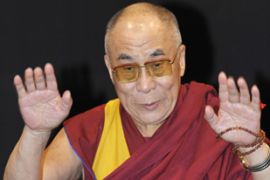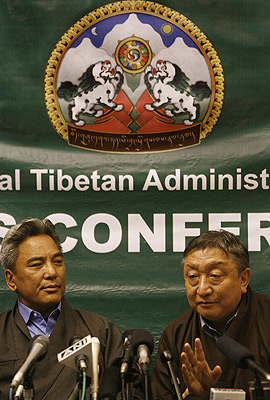Tibetans meet to plan new strategy
Hundreds of exiles gather in India to re-evaluate struggle for autonomy from China.

A Chinese government spokesman earlier dismissed the gathering to discuss the core of the decades-old dispute, saying that such “separatist attempts will get nowhere”.
On Sunday, the Dalai Lama’s envoys to the Beijing talks said China had rejected a detailed plan on how Tibetans could meet their needs of autonomy within the framework of the Chinese constitution.
Thorny issue
Before Monday’s meeting, the Dalai Lama urged the 500 participants to consider all aspects of policy regarding China, ensuring that the thorny issue of whether to push for full independence is tackled.
 |
| The Dalai Lama’s envoys said Beijing had rejected their plan for autonomy [AFP] |
Tibetan officials said the 73-year-old Nobel Peace laureate would not be attending the meeting, in a bid to ensure that any decisions are independent of his own views.
Many Tibetans say they were an independent nation before communist troops invaded in 1950, while Beijing says the Himalayan region has been part of its territory for centuries.
Some younger Tibetan exiles are now demanding the Dalai Lama’s campaign for “meaningful autonomy” be replaced by a more aggressive pro-independence stance.
“We certainly hope the cause of independence for Tibet is stronger by the end of the week,” said Tsewang Rigzin, president of the influential Tibetan Youth Congress.
“I was a bit surprised when the Dalai Lama called this meeting,” he told AFP. “But it was high time. As he says, he has done everything in his power and not made progress.”
The meeting in the Indian hill town, which has no policy-making power because any recommendations must be approved by the exiled Tibetan parliament, comes as the Tibetan movement braces for change.
‘Strong frustration’
Some Tibetans have cited the March crackdown on anti-Chinese protests in the Tibetan capital, Lhasa – which left 200 Tibetans dead according to the government-in-exile – as proof that a new, more radical strategy is needed.
Tenzin Bayul, one of the delegates gathered in Dharamsala, said she felt it was a moment of historic importance.
“Non-violence is central to our culture, but frustration is strong among young Tibetans and people get very angry about the lack of success,” said the young activist studying at Tufts University in Boston.
“This situation has gone on for so long, and the Dalai Lama is tired.”